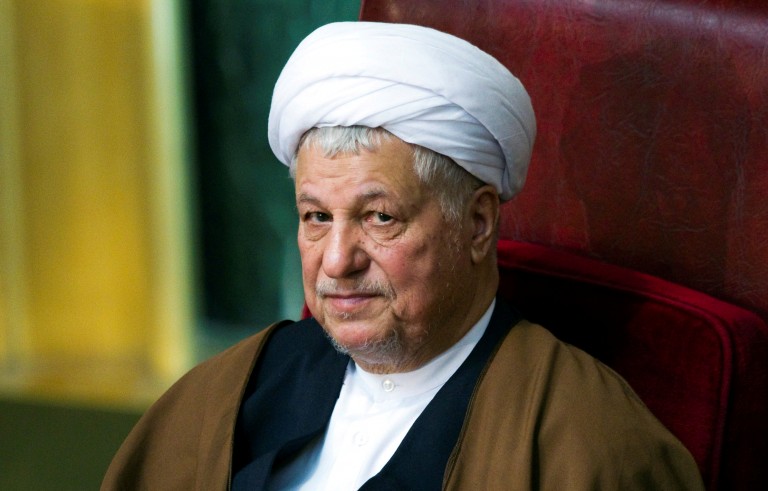(单词翻译:单击)
JUDY WOODRUFF: On Sunday, one of the founders of the Islamic Revolution in Iran died at age 82.
Ali Akbar Hashemi Rafsanjani helped to lead the 1979 uprising, and went on to serve both as the powerful speaker of the parliament and as Iran's president in the 1980s. He was also a mentor of their current president, Hassan Rouhani, who will be up for reelection this May.
Joining me now to discuss Rafsanjani, his influence and Iran going forward is Karim Sadjadpour. He's a senior fellow at the Carnegie Endowment for International Peace.
Karim, thank you for being back with us.
KARIM SADJADPOUR, Carnegie Endowment For International Peace: Thank you. Thank you, Judy.
JUDY WOODRUFF: What made Rafsanjani the influential figure that he was?
KARIM SADJADPOUR: Well, to begin, he was a close confidant of the father of the Islamic Revolution, Ayatollah Khomeini.
And I think what was unique about Rafsanjani was that he was always the cleric in Iran who was interested in putting the country's interests, namely, its economic interests, before revolutionary ideology.
But he ultimately lost that battle against the current supreme leader, Ayatollah Ali Khamenei, who always believed that the revolutionary ideology should come first.
JUDY WOODRUFF: And, as you wrote, you have written in the last couple of days, he helped to put Khamenei, the current ayatollah, in power, but almost immediately started trying to get him out of power. It's a fascinating story.
KARIM SADJADPOUR: It really is. I call it Shiite Shakespeare, like a Shakespearian epic, because he was the kingmaker.
He made Khamenei supreme leader in 1989, thinking that he could — he would be weak and pliant and Rafsanjani could control him. And I think he spent the last three decades of his life trying to wrestle power back from Khomeini, unsuccessfully.

JUDY WOODRUFF: They were two very different men, weren't they? Why was one successful and the other one wasn't ultimately?
KARIM SADJADPOUR: Well, I think, ultimately, what was — what made Khamenei successful is, I think he understood an important Machiavellian rule, which is, in authoritarian regimes, it's much more important to be feared than to be loved.
So, Khamenei very carefully over the last couple decades had cultivated the military, the Revolutionary Guard, and so that was deeply helpful to him. At the same time, whereas Khamenei had a reputation for being financially clean, Rafsanjani and his family had a terrible reputation of being economically corrupt, which provoked a lot of popular resentment against them.
JUDY WOODRUFF: Resentment, and yet you're telling us his death means a great deal for Iran.
KARIM SADJADPOUR: Well, yes, he was one of the pillars, the last two remaining pillars of the 1979 revolution who played a very important role as a mentor to the younger generation of technocrats, and, as you mentioned, President Hassan Rouhani.
And he was kind of a counterweight against more radical forces in Iran. I think that obituary writers are very confused about Rafsanjani, because, on one hand, he was someone who had blood on his hands. He ordered the killing of dissidents and intellectuals within Iran. He was implicated in terrorist operations overseas.
But, at the same time, in the context of the Islamic Republic of Iran, he was more moderate than his peers.
JUDY WOODRUFF: Well, that was my next question: How moderate was he truly?
KARIM SADJADPOUR: So, in a Western liberal context, he wasn't a Jeffersonian democrat, but in the context of Iran, as I said, he favored putting the country's economic interests before revolutionary ideology, which meant things that — that he was supportive of detente with the United States.
He was supportive of a cordial relationship with Saudi Arabia. And he differed on these issues of revolutionary ideology, in contrast to the supreme leader.
JUDY WOODRUFF: I think we mentioned he was a mentor to the current president, President Rouhani.
So, what does it mean now that he's gone from the scene? What do you expect to see in the months to come?
KARIM SADJADPOUR: I think May 2017 will be the first litmus test. That's Iran's presidential elections.
I think we have learned in the United States that predicting presidential elections even…
JUDY WOODRUFF: We have learned that.
KARIM SADJADPOUR: We have learned — even in a democratic system is difficult, let alone in an opaque, authoritarian system like Iran.
You know, I made the comparison, I make the comparison with Bill Clinton. Rafsanjani was an elder statesman of Iranian politics. He served as president of the country. But his political — he didn't have a political future. He had a prominent past.
And so I ultimately don't think that this is a game-changer for Iran, in that the powers that be currently, the supreme leader, the Revolutionary Guards, are going to remain the main powers that be. But, you know, an influential counterweight against them has now been removed.
JUDY WOODRUFF: Karim Sadjadpour, thank you very much.
KARIM SADJADPOUR: Thank you, Judy.


